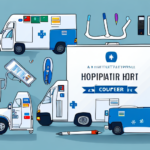Importance and Role of Medical Couriers
Medical couriers are integral to the healthcare ecosystem, ensuring that essential medical supplies, equipment, and specimens are delivered safely and promptly. Their specialized services support the seamless operation of hospitals, clinics, laboratories, and other healthcare facilities.
Why Medical Couriers Are Essential
Medical couriers facilitate the timely transport of critical items such as blood samples, organs for transplant, and temperature-sensitive medications. The timely delivery of these items can significantly impact patient outcomes and the overall efficiency of healthcare services.
How Medical Couriers Ensure Safe Transport of Sensitive Items
Professional medical courier services employ specialized containers and packaging techniques to maintain the integrity of sensitive items. For instance, temperature-controlled containers are used for vaccines and other perishables, ensuring they remain within required temperature ranges throughout transit. Additionally, couriers adhere to strict handling protocols to prevent contamination and damage.
Commonly Transported Medical Items and Their Special Requirements
- Blood and Tissue Samples: Require refrigeration and secure packaging to prevent degradation and contamination.
- Pharmaceuticals: Medications, especially those requiring refrigeration, need precise temperature control.
- Medical Equipment: Devices such as oxygen tanks and mobility aids require careful handling to avoid damage.
- Organs for Transplant: Demand rapid and secure transport to ensure viability for transplantation.
Each of these items has unique transportation requirements that specialized medical couriers are trained to handle effectively.
Benefits of Professional Medical Courier Services
Utilizing professional medical courier services offers numerous advantages over standard delivery methods, enhancing the reliability and efficiency of medical logistics.
Enhanced Reliability and Speed
Professional couriers provide expedited delivery options that are crucial for time-sensitive medical items. According to a report by the U.S. Food and Drug Administration (FDA), timely delivery of medical supplies can significantly reduce patient wait times and improve treatment outcomes.
Same-Day Delivery for Critical Supplies
Same-day delivery services ensure that urgent medical supplies reach their destinations without delay. This capability is vital for emergency situations, where every minute counts in patient care and treatment. For example, the American Society of Transplantation emphasizes the importance of rapid organ transport to increase the success rates of transplant surgeries.
Choosing the Right Medical Courier
Selecting an appropriate medical courier service is crucial for maintaining the integrity and timeliness of medical deliveries. Several key factors should be considered to ensure the chosen courier meets your specific needs.
Key Factors to Consider
- Experience in Healthcare: Choose couriers with a proven track record in handling medical items.
- Compliance with Regulations: Ensure the courier adheres to FDA and Department of Transportation (DOT) regulations.
- Advanced Tracking: Opt for services that offer real-time tracking and monitoring of shipments.
- 24/7 Support: Reliable customer support is essential for addressing any issues promptly.
Top Traits of Reliable Courier Companies
Reliable medical courier companies exhibit traits such as punctuality, transparency, and robust security measures. They also provide comprehensive training to their staff, ensuring adherence to best practices in handling medical items.
Evaluating Service Quality
Assessing the quality of a medical courier service involves reviewing their service history, client testimonials, and industry certifications. Additionally, checking their ratings on platforms like Yelp and Google Maps can provide insights into their reliability and customer satisfaction levels.
Compliance and Regulations
Shipping medical items is subject to stringent regulatory standards to ensure safety, security, and efficacy. Understanding and adhering to these regulations is essential for both couriers and healthcare providers.
Understanding Shipping Regulations
Medical shipments must comply with regulations set by authorities such as the FDA and DOT. These regulations cover aspects like packaging, labeling, and documentation. For example, the Pipeline and Hazardous Materials Safety Administration (PHMSA) sets guidelines for the safe transportation of hazardous substances, including certain pharmaceuticals.
Risks of Using Non-Specialized Couriers
Using regular courier services for medical deliveries can lead to non-compliance with regulatory standards, resulting in shipment delays, legal repercussions, and compromised patient safety. Specialized medical couriers are trained to navigate these regulations effectively, reducing the risk of non-compliance.
Technology in Medical Courier Services
Technological advancements have revolutionized the medical courier industry, enhancing efficiency, transparency, and reliability in medical logistics.
Advanced Tracking and Monitoring
Modern medical couriers utilize GPS and IoT-based tracking systems to monitor shipments in real-time. This technology provides healthcare providers with visibility into the location and status of their shipments, enabling proactive management of delivery schedules.
Route Optimization and Efficiency
Advanced software solutions assist couriers in optimizing delivery routes, minimizing transit times, and reducing operational costs. Route optimization also ensures that urgent shipments reach their destinations promptly, enhancing overall service efficiency.
Cost Management in Medical Courier Services
While professional medical courier services offer numerous benefits, managing costs effectively is essential for healthcare organizations to maintain budgetary constraints.
Strategies to Save Costs
- Bundling Shipments: Combining multiple shipments can lead to volume discounts and reduced per-package costs.
- Flexible Delivery Options: Utilizing flexible delivery schedules can help in optimizing delivery routes and reducing expenses.
- Negotiating Rates: Engage in negotiations based on shipping frequency and volume to secure more favorable rates.
Negotiating Rates and Volume Discounts
Healthcare organizations can leverage their shipping volumes to negotiate better rates with courier services. Establishing long-term partnerships with couriers can also lead to additional cost-saving opportunities and enhanced service agreements.
Commonly Transported Medical Items and Their Special Requirements
Medical couriers handle a diverse range of items, each with specific transportation requirements to ensure their safety and efficacy.
- Blood and Tissue Samples: Require refrigeration and secure packaging to prevent degradation.
- Medications: Temperature-sensitive pharmaceuticals need precise climate control during transit.
- Medical Equipment: Durable and secure packaging is essential to prevent damage to complex devices.
- Organs for Transplant: Rapid and secure transport is crucial to maintain viability for transplantation procedures.
Adhering to these specific requirements is essential for maintaining the quality and safety of medical items during transportation.
Conclusion
Finding a reliable medical courier service is vital for ensuring the safe and timely delivery of critical medical items. By considering factors such as compliance, reliability, and technological capabilities, healthcare organizations can select a courier that meets their specific needs. Investing in professional medical courier services not only enhances operational efficiency but also plays a crucial role in improving patient outcomes. Start your search for a trusted medical courier near you today to ensure your healthcare delivery system functions seamlessly.




















